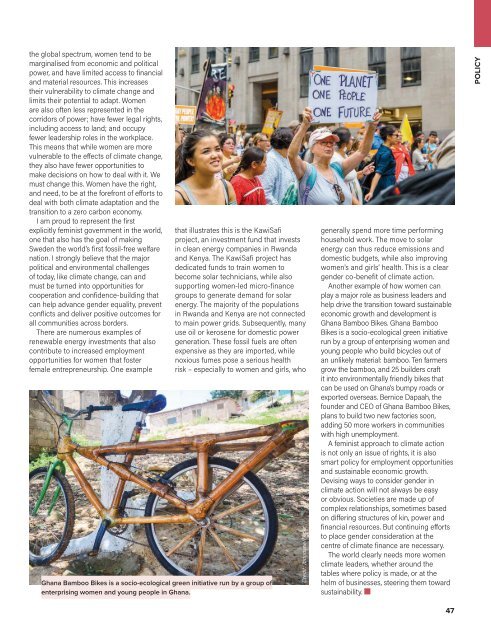Climate Action 2017-2018
Create successful ePaper yourself
Turn your PDF publications into a flip-book with our unique Google optimized e-Paper software.
the global spectrum, women tend to be<br />
marginalised from economic and political<br />
power, and have limited access to financial<br />
and material resources. This increases<br />
their vulnerability to climate change and<br />
limits their potential to adapt. Women<br />
are also often less represented in the<br />
corridors of power; have fewer legal rights,<br />
including access to land; and occupy<br />
fewer leadership roles in the workplace.<br />
This means that while women are more<br />
vulnerable to the eff ects of climate change,<br />
they also have fewer opportunities to<br />
make decisions on how to deal with it. We<br />
must change this. Women have the right,<br />
and need, to be at the forefront of eff orts to<br />
deal with both climate adaptation and the<br />
transition to a zero carbon economy.<br />
I am proud to represent the first<br />
explicitly feminist government in the world,<br />
one that also has the goal of making<br />
Sweden the world’s first fossil-free welfare<br />
nation. I strongly believe that the major<br />
political and environmental challenges<br />
of today, like climate change, can and<br />
must be turned into opportunities for<br />
cooperation and confidence-building that<br />
can help advance gender equality, prevent<br />
conflicts and deliver positive outcomes for<br />
all communities across borders.<br />
There are numerous examples of<br />
renewable energy investments that also<br />
contribute to increased employment<br />
opportunities for women that foster<br />
female entrepreneurship. One example<br />
that illustrates this is the KawiSafi<br />
project, an investment fund that invests<br />
in clean energy companies in Rwanda<br />
and Kenya. The KawiSafi project has<br />
dedicated funds to train women to<br />
become solar technicians, while also<br />
supporting women-led micro-finance<br />
groups to generate demand for solar<br />
energy. The majority of the populations<br />
in Rwanda and Kenya are not connected<br />
to main power grids. Subsequently, many<br />
use oil or kerosene for domestic power<br />
generation. These fossil fuels are often<br />
expensive as they are imported, while<br />
noxious fumes pose a serious health<br />
risk – especially to women and girls, who<br />
Ghana Bamboo Bikes is a socio-ecological green initiative run by a group of<br />
enterprising women and young people in Ghana.<br />
Credit: Jbdodane/Flickr<br />
generally spend more time performing<br />
household work. The move to solar<br />
energy can thus reduce emissions and<br />
domestic budgets, while also improving<br />
women’s and girls’ health. This is a clear<br />
gender co-benefit of climate action.<br />
Another example of how women can<br />
play a major role as business leaders and<br />
help drive the transition toward sustainable<br />
economic growth and development is<br />
Ghana Bamboo Bikes. Ghana Bamboo<br />
Bikes is a socio-ecological green initiative<br />
run by a group of enterprising women and<br />
young people who build bicycles out of<br />
an unlikely material: bamboo. Ten farmers<br />
grow the bamboo, and 25 builders craft<br />
it into environmentally friendly bikes that<br />
can be used on Ghana’s bumpy roads or<br />
exported overseas. Bernice Dapaah, the<br />
founder and CEO of Ghana Bamboo Bikes,<br />
plans to build two new factories soon,<br />
adding 50 more workers in communities<br />
with high unemployment.<br />
A feminist approach to climate action<br />
is not only an issue of rights, it is also<br />
smart policy for employment opportunities<br />
and sustainable economic growth.<br />
Devising ways to consider gender in<br />
climate action will not always be easy<br />
or obvious. Societies are made up of<br />
complex relationships, sometimes based<br />
on diff ering structures of kin, power and<br />
financial resources. But continuing eff orts<br />
to place gender consideration at the<br />
centre of climate finance are necessary.<br />
The world clearly needs more women<br />
climate leaders, whether around the<br />
tables where policy is made, or at the<br />
helm of businesses, steering them toward<br />
sustainability.<br />
47<br />
POLICY












